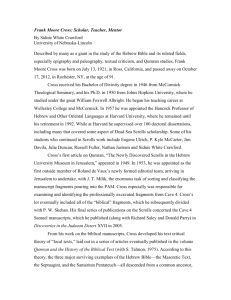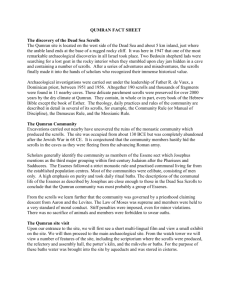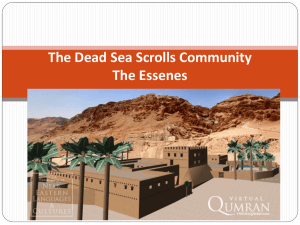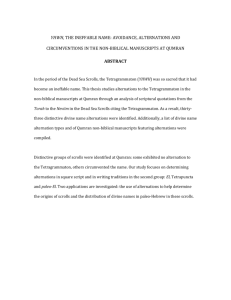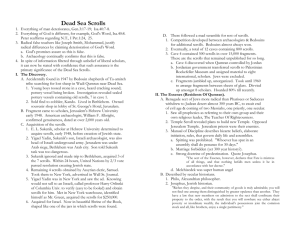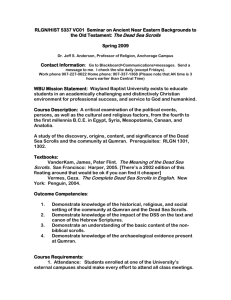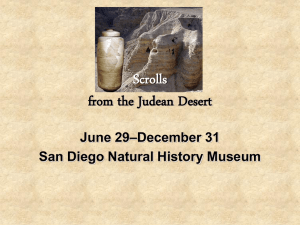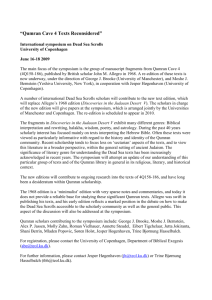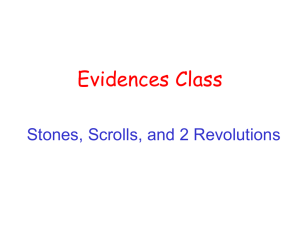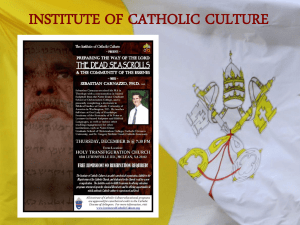seminar anc ne bkgrd ot:dead sea scrolls
advertisement
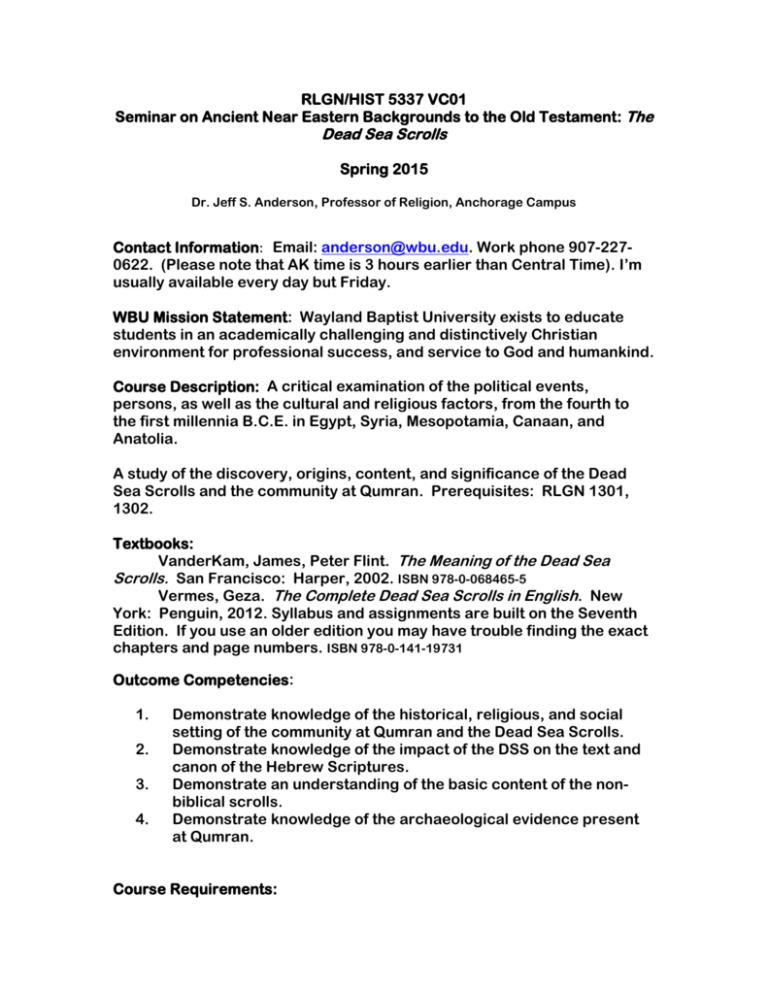
RLGN/HIST 5337 VC01 Seminar on Ancient Near Eastern Backgrounds to the Old Testament: The Dead Sea Scrolls Spring 2015 Dr. Jeff S. Anderson, Professor of Religion, Anchorage Campus Contact Information: Email: anderson@wbu.edu. Work phone 907-2270622. (Please note that AK time is 3 hours earlier than Central Time). I’m usually available every day but Friday. WBU Mission Statement: Wayland Baptist University exists to educate students in an academically challenging and distinctively Christian environment for professional success, and service to God and humankind. Course Description: A critical examination of the political events, persons, as well as the cultural and religious factors, from the fourth to the first millennia B.C.E. in Egypt, Syria, Mesopotamia, Canaan, and Anatolia. A study of the discovery, origins, content, and significance of the Dead Sea Scrolls and the community at Qumran. Prerequisites: RLGN 1301, 1302. Textbooks: VanderKam, James, Peter Flint. The Meaning of the Dead Sea Scrolls. San Francisco: Harper, 2002. ISBN 978-0-068465-5 Vermes, Geza. The Complete Dead Sea Scrolls in English. New York: Penguin, 2012. Syllabus and assignments are built on the Seventh Edition. If you use an older edition you may have trouble finding the exact chapters and page numbers. ISBN 978-0-141-19731 Outcome Competencies: 1. 2. 3. 4. Demonstrate knowledge of the historical, religious, and social setting of the community at Qumran and the Dead Sea Scrolls. Demonstrate knowledge of the impact of the DSS on the text and canon of the Hebrew Scriptures. Demonstrate an understanding of the basic content of the nonbiblical scrolls. Demonstrate knowledge of the archaeological evidence present at Qumran. Course Requirements: 1. Attendance: For Virtual Campus courses, the instructor can track weekly participation in just about every area of BlackBoard by using “Course Statistics.” And I do! 2. Examinations: There will be a mid term and final examination. 3. Quizzes over the Reading: There will be weekly quizzes over the reading in the texts. 4. Discussion Board: Each student will lead a discussion board forum for the rest of the class on one of the Qumran scrolls. Each discussion board leader should create a thread with an attachment (2-3 pages in length) that provides a brief summary of the scroll for that week. Then on the thread ask three questions. These questions should not only reflect the content of that particular scroll but should generate some discussion. Class members should respond to these questions and the discussion leader facilitates the discussion. Instructor will assign the discussion board topics the first week of class. Class size will dictate assignments. 5. Research Paper: Students will prepare an introduction and overview of one of the major sectarian documents of the Dead Sea Scrolls. Paper will include overview, date, setting, outline, contents, and significance for scroll studies. Research paper will be completed according to standards specified by Wayland Baptist University’s Division of Religion. (Religion students only: History students follow the requirements of your appropriate school. Religion folks go to: http://www.wbu.edu/academics/schools/religion_and_philosophy/student_ help/default.htm This research paper is due on the Saturday of week 10, the week before finals. Biblical Scrolls The Great Isaiah Scroll (1QIsaa) The Great Psalms Scroll (11QPsa) Rules: The Community Rule (1QS, 4Q255-264a, 5Q11) (The Damascus Document) (4Q266-272) Geniza A, B The War Scroll (1 QM, 4Q491-496) Legal Texts: The Temple Scroll (11QTS, 11 Q19-20) Miqsat Maase ha-Torah, Sectarian Manifesto (4QMMT) Commentaries The Habakkuk Pesher (1QpHab) The Nahum and Psalms Peshers (4Q169, 4Q171, 4Q173, 1Q16) Thematic Commentaries (4QFlorilegium [4Q174], 4QCatena A [4Q177], 11QMelchizedek [11Q13] Rewritten Scripture: The Genesis Apocryphon (1QapGen, 1Q20) Psalms/Wisdom The Thanksgiving Psalms (1QH, 1Q35, 4Q427-432) The Songs of the Sabbath Sacrifice (4Q400-407, 11Q17, Masada Frag.) 4QInstruction (1Q26, 4Q415-418a, 418c, 423) Cryptic Texts The Copper Scroll (3Q15) Course Grading: Mid Term Final Examination Research Paper Discussion Board Facilitation Quiz Grades 100 points 100 points 100 points 100 points 60 points Course Outline: Week One: Week of Feb 23 The Discovery of the Scrolls Overview Geographical Setting for the Scrolls Discovery and Early Publications Quagmire, Scandals and Scroll Wars Liberation of the Scrolls Read VanderKam and Flint, chapters 1 and 18 Read Vermes: Introduction Discussion Board Topic: The Great Isaiah Scroll (1QIsaa) and the Great Psalm Scroll (11QPsa) Week Two: Week of March 1 The Second Temple Historical Background for the Scrolls The Maccabean Revolt and the Hasmonean Dynasty Roman Domination of Judea The Destruction of the Temple and the Roman Occupation of Qumran Read Vermes, Chapters II and III Discussion Board Topic: The Community Rule (1QS, 4Q255-264a, 5Q11). Find these texts and read them in Vermes before responding to the discussion board. Week Three: Week of March 8 What are the Dead Sea Scrolls? Four Kinds of Literature at Qumran Date, Composition, Setting Scripts used for Writing the Scrolls The Dead Sea Scrolls and the Bible: (Part One) The Hebrew Bible/Old Testament Before the Scrolls The Scriptures at Qumran: Pluriformity and the Biblical Text Canon and Text at Qumran Read VanderKam and Flint: Chapters 2-4 Discussion Board Topic: The Damascus Document (CD, 4Q266272) Find these texts and read them in Vermes before responding to the discussion board. Spring Break: March 15-21 Week Four: Week of March 22 The Dead Sea Scrolls and the Bible (Part Two) Apocrypha and Pseudepigrapha and the Scrolls The Pesher as Early Scriptural Commentary Biblical Interpretation and Reinterpretation at Qumran Read VanderKam and Flint: Chapters 5-7 Discussion Board Topic: The Habakkuk Pesher (1QpHab), Apocryphal Psalms (page 307-318) and Song for the Holocaust of the Sabbath (page 329-339). Find and read in Vermes before responding to the discussion board. Week Six: Week of April 5 The Non-Biblical Scrolls at Qumran Legal Texts Rules Commentaries Rewritten Scriptures Calendars Poetic Texts Wisdom Texts Apocalyptic Texts Read VanderKam and Flint: Chapters 8-9 Discussion Board Topic: The Temple Scroll (11QTS, 11 Q19-20), Genesis Apocryphon (1QapGen, 1Q20). Find these texts and read them in Vermes before responding to the discussion board. Week Seven: Week of April 12 The Community at Qumran Archaeology and Qumran The Pesharim and Qumran History The Case for the Essene Hypothesis The Groningen Hypothesis. Essenism and Qumran: The Work of Gabriele Boccaccini Sadducees and Qumran: The Work of Lawrence Schiffman Read VanderKam and Flint: Chapters 10 and 13. Read Vermes: The Community Rule (97-117). Discussion Board Topic: Miqsat Maase ha-Torah, Sectarian Manifesto (4QMMT), Thanksgiving Hymns (1QH, 1Q36, 4Q42732) Find and read them in Vermes before responding to the discussion board. Week Eight: Week of April 19 Community Life in the Community Rule and the Damascus Document Initiation Rites Ritual Purity Table Fellowship Community Leadership and the Teacher of Righteousness Women and Marriage Sociology, Theology and the Scrolls The Nature of God Worship and the Yahad. Prayer and Ritual Calendar Read VanderKam and Flint: Chapters 11-12 Read Vermes, Chapter IV Discussion Board Topic: The Copper Scroll (3Q15), 4QInstruction (4Q415-418) Find and read in Vermes before responding to the discussion board. Week Nine: Week of April 26 The Dead Sea Scrolls, the New Testament and the Early Christian Church Language of the DSS and the New Testament Characters Practices of Community Eschatology Read VanderKam and Flint: Chapters 14-17 Discussion Board Topic: The War Scroll (1 QM, 4Q491-496). Find and read in Vermes before responding to the discussion board. Week Ten: Week of May 3: Research Papers Due No homework Week Eleven: Week of May 10: Final Exam Statement on Disabilities: It is the University’s policy that no otherwise qualified person experiencing disabilities be excluded from participation in, be denied the benefits of, or be subject to discrimination under any educational program or activity in this university. If a student has an impairment that would require additional accommodations by the instructor and/or the University, then please inform the instructor of Campus Dean prior to the first night of class. Statement on Academic Honesty: University students are expected to conduct themselves according to the highest standards of academic honesty. Academic misconduct for which a student is subject to penalty includes all forms of cheating, such as illicit possession of examinations or examination materials, forgery, or plagiarism. Plagiarism is the presentation of the work of another as one’s own work. It is the student’s responsibility to be familiar with penalties associated with plagiarism stated in the catalog. Statement on Plagiarism and Academic Dishonesty: Wayland Baptist University observes a zero tolerance policy regarding academic dishonesty. Per university policy as described in the academic catalog, all cases of academic dishonesty will be reported and second offenses will result in suspension from the university. Bibliography: Anderson, Jeff. The Internal Diversification of Second Temple Judaism. Lanham: University Press of America, 2002. Boccaccini, Gabriele. Beyond the Essene Hypothesis: The Parting of the Ways Between Qumran and Enochic Judaism. Grand Rapids: Wm. B. Eerdmans1998. Charlesworth, James H. The Pesharim and Qumran History: Chaos or Consensus? Grand Rapids: Wm. B. Eerdmans, 2002. Eshel, Hanan. The Dead Sea Scrolls and the Hasmonean State. Grand Rapids: Eerdmans, 2008. Lim, Timothy H. The Dead Sea Scrolls: A Very Short Introduction. Oxford: Oxford University Press, 2005. García Martínez and Eibert J.C. Tigchelaar, The Dead Sea Scrolls Study Edition. 2 Vols. Grand Rapids: Eerdmans, 1997. Magness, Jodi. The Archaeology of Qumran and the Dead Sea Scrolls. Grand Rapids: Wm. B. Eerdmans, 2002. Schiffman, Lawrence H. Reclaiming the Dead Sea Scrolls: Their True Meaning for Judaism and Christianity. New York: Doubleday, 1994. Schiffman, Lawrence H. and James C. VanderKam. Encyclopedia of the Dead Sea Scrolls. 2 Vols. Oxford: Oxford University Press, 2000. Schuller, Eileen M. The Dead Sea Scrolls: What Have We Learned? Louisville: Westminster, 2006. Talmon, Shemaryahu. The World of Qumran from Within. Leiden: Brill, 1989. Tov, Emanuel. Textual Criticism of the Hebrew Bible. Minneapolis: Fortress Press, 2001. Ulrich, Eugene. The Dead Sea Scrolls and the Origins of the Bible. Grand Rapids: Wm. B. Eerdmans, 1999. VanderKam, James, Peter Flint. The Meaning of the Dead Sea Scrolls. San Francisco: Harper, 2002. VanderKam, James. The Dead Sea Scrolls Today. Grand Rapids: Wm B. Eerdmans, 2010. Vermes, Geza. The Complete Dead Sea Scrolls in English. New York: Penguin, 1997. Wise, Michael, Martin Abegg, Jr., and Edward Cook. The Dead Sea Scrolls: A New Translation. San Francisco: HarperCollins, 1996. Academic Internet Sites: Biblical Archaeology Review http://www.bib-arch.org Digital Dead Sea Scrolls Project http://dss.collections.imj.org.il/project Dead Sea Scrolls Digital Library http://www.deadseascrolls.org.il/?locale=en_US Flint, Peter. http://www.deadseascrolls.org Library of Congress and the DSS http://www.loc.gov/exhibits/scrolls/toc.html Orion Center for the Study of the DSS http://orion.mscc.huji.ac.il/ Shrine of the Book http://www.imj.org.il/eng/shrine/
